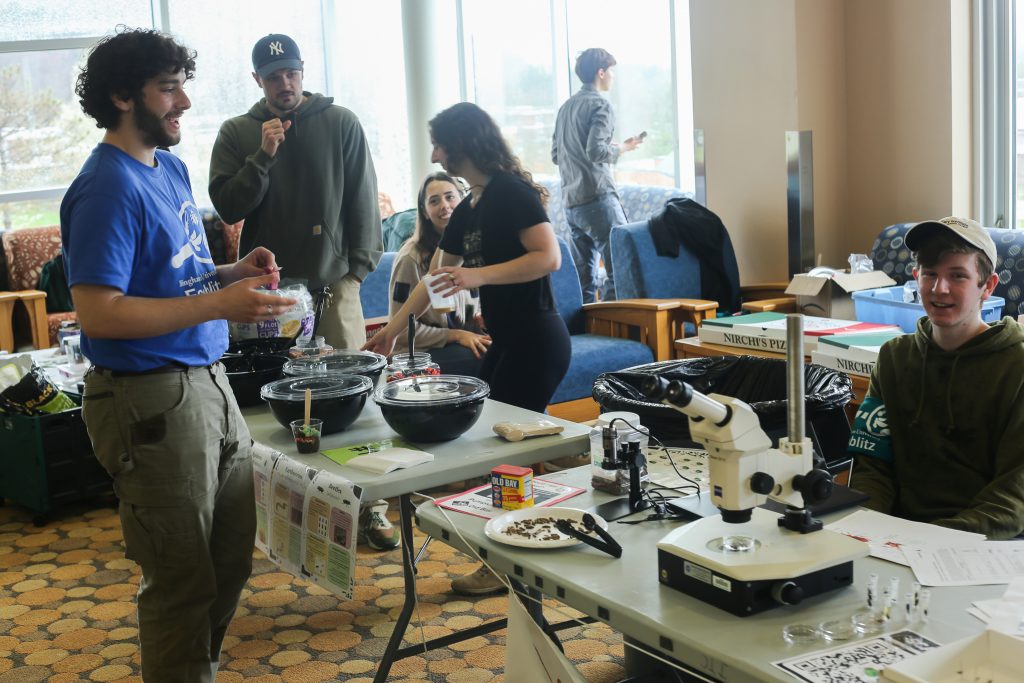The Center for Integrated Watershed Studies organized Binghamton University’s second-annual EcoBlitz festival on Saturday, kicking off weeks of ecological work.
The event, which brought together several student organizations, research groups, professors and local conservationists, began in the Appalachian Collegiate Center’s Lounge. The campaign, which ends on May 4, encourages the campus community to use the iNaturalist app, which allows its users to share ecological observations about the area’s flora and fauna.
University experts will then work to verify these observations and make the community data usable for research. iNaturalist will award prizes to whoever identifies the most species found on campus. The kickoff is one of many “bioblitzes” — events hosted at colleges and universities where scientists organize field studies for local ecosystems.
“These ‘bioblitz’ events are held worldwide to collect biodiversity data using community science efforts,” Kirsten Prior, an assistant professor of biology and a key event organizer, wrote in an email. “They motivate the community to get outside and observe nature while collecting data that can be used in research to understand patterns in biodiversity and how it may change over time.”
The University’s EcoBlitz differed from other campus bioblitzes because it included sustainability and biodiversity-focused student organizations, including Zero Hour Binghamton and the Audubon Society. Several members of Zero Hour’s E-Board, including Stephen Corbisiero, the organization’s president and a senior double-majoring in environmental studies and geography, sat on the EcoBlitz planning committee alongside Audubon Society leadership.
“We are trying to get as many people exposed to the Nature Preserve as possible to appreciate the value of nature,” Corbisiero said. “Frankly, a lot of people don’t know that the Nature Preserve is here and that it exists. It’s a great resource, so we are trying to get as many people to engage with not only the science aspects, but also spending time out in nature and really engaging with [various] species.”
The Nature Preserve, which is 190 acres and consists of a broad range of ecosystems and local wildlife, faces threats from both human and natural activity and is a secondary forest — meaning it was cleared and had to regenerate. Even with ecosystem regeneration, not all species of plant life have returned, including several local wildflower species, while plants like hemlock trees have spread. Overgrazing by deer, which prevents vegetation growth, has also negatively impacted the preserve’s ecological health, and polluted water from minerals like salt have also harmed amphibian populations.
Prior and other EcoBlitz organizers highlighted the importance of student awareness of these anthropogenic changes affecting the Nature Preserve. A second campaign goal was to encourage students to spend more time outdoors to appreciate its natural beauty.
“There’s a growing body of research that shows that spending time with nature is good for people,” said Christina Baer, an assistant research professor in the first-year Research Immersion Program. “It tends to reduce stress, [and] in some cases, reduce anxiety.”
While the event was supposed to be held in the Nature Preserve, it was moved inside due to inclement weather, with the environmentally-themed activities organizers ready to answer questions while groups tabled. Among these tables were representatives from the Onondaga Nation, who were promoting the University’s Three Sisters Garden located in the Science I courtyard. The garden fosters a relationship between Indigenous people and their ancestral land through the planting of three different crops — corn, beans and squash.
Members of Prior’s ecology lab, which focuses on how human activity changes ecosystems , had children’s books about insect life for guests to look through. There was a table serving crickets to those brave enough to try one.
“Bringing in undergraduates to the leadership team who are passionate about and contribute significantly to BU’s biodiversity and sustainability efforts was transformational this year,” Prior wrote in an email. “Working with undergraduates, professors and graduate students to organize this event brought together complementary perspectives and expertise — and has been fun and productive.”
Editor’s Note (4/16/24): This article has been updated to fix a few errors. We have corrected Professor Prior’s name to Kirsten. We have also amended the event time to three weeks. Finally, we have corrected the caption to represent the photo accurately. Pipe Dream regrets the errors.



